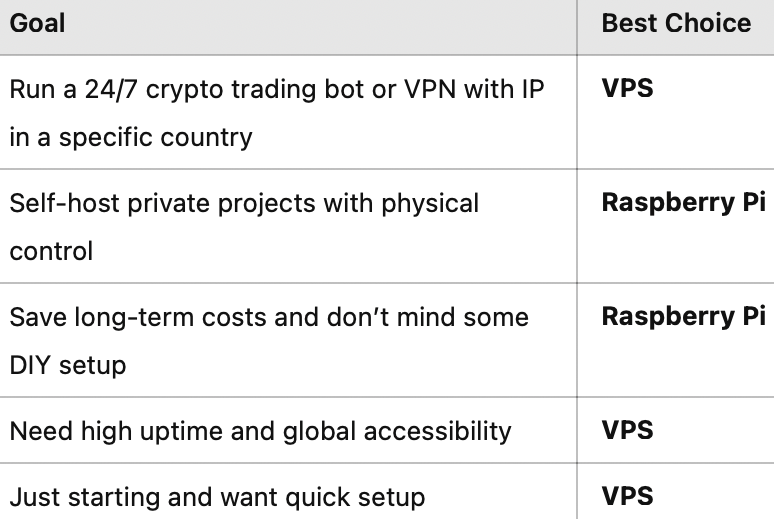Raspberry Pi vs. VPS: Which One Should You Choose?

Performance, Price, and Practicality Compared for Developers and Tinkerers
When you want to run your own applications, services or even hosting your websites, out of many ways there are two major options: a Raspberry Pi or Virtual Private Server(VPS).
But which one is better choice for you ?
Im going to show you the differences between Raspberry Pi and VPS in a simple and beginner-friendly way.
By the end , you’ll have a clearer picture of which setup is the best for your needs. Whether you’re hosting a crypto bot , a personal website or your app.
What is a Raspberry Pi?
The Raspberry Pi is a small , affordable computer that you can set up at home. It’s fits in the palm of your hand, It was originally designed to teach kids how to code, but powerful enough to run full Linux distributions, servers and more.
Thin of it like your own mini computer, You connect it to your home network and power source then you can run almost anything you would on a traditional Linux server.
- One important benefit of Raspberry Pi is a one-time purchase and doesn’t come with any recurring hosting fees.
- It’s ideal for DIY enthusiasts, developers and people who wants complete control over their hardware and data.
What is a VPS?
A Virtual Private Server(VPS) is a virtual machine hosted on a cloud provider’s server, that runs in a data center and is accessed over the internet with SSH or remote Desktop.
VPS works this way: You rent a portion of a physical machine (with dedicated RAM, CPU and storage) from a hosting provider and you get full root access — just like regular physical server.
- VPS’s are always online, with reliable internet bandwidth and you can buy one hosted in various global locations, allowing you to choose an IP address for specific country.
Key Differences Between Raspberry Pi and VPS
Let’s dive in and compare these two side-by-side:
1. Cost
- Raspberry Pi: One-time payment (~$50 to $100 based on model and accessories).
- VPS: Monthly or yearly payments (~$3 to $30+ per month depending on specs and provider).
💡 For those of you planing to run your server long-term(+1 year), the Raspberry Pi might be better option.
2. IP Address & Location
- Rasberry Pi: Uses your home internet’s IP address. This is a dynamic public IP, unless you pay for a static one from your ISP. The IP location shows your home country.
- VPS: Comes with a static public IP address located in the data center’s country. perfect for those of you needing a consistent IP in a specific location like Germany or US or … .
💡 Need a Stable IP in a specific location for a VPN or bot ? VPS is the winner.
3. Power & Uptime
- Raspberry Pi: Depends on your internet and home power. May have a downtime during outges.
- VPS: Hosted in a professional data center with 99.9% uptime guarantees, backups and stable connectivity.
💡 If uptime is crucial (e.g., Web app or VPN), VPS offers better reliability.
4. Performance & Scalability
- Raspberry Pi: Limited by hardware(AMD processor and 1–8 GB RAM). Great for lightweight services.
- VPS: Scalable. you can choose 1vCPU , 2GB RAM or go much higher.(Intel/AMD CPUs)
💡 Running multiple apps like WordPress, VPN and bots ? A mid-range VPS might outperform the pi.
5. Privacy & Control
- Raspberry Pi: Total control over your hardware and network. Great for privacy-focused users.
- VPS: You control the OS and software but the physical server is owned by someone else.
💡 If you want total physical control for security Go with Pi.
6. Ease of Setup
- Raspberry Pi: Requires physical setup (Plugging in, flashing SD card and configuring OS). Not hard but needs some effort.
- VPS: Instant setup online — login with SSH and start working within minutes.
💡 Want a quick start ? VPS is more beginner friendly.
So , Which one should you choose ?
It depends on your goals:

Final Thoughts
Both of them have their strenghts. They are excellent tools for tech lovers and developers and anyone who love to learn something new.
The Raspberry Pi is great for privacy, DIY projects and long-term savings — but only if your internet and power setup can support it.
VPS , on the other hand, offers consistent performance plus stable IP addresses and much easier to set up and maintain remotely.
No matter which you choose, you’ll gain valuable skills in Linux, networking and server management.
You can fuel my next data science deep dive by buying me a coffee ☕!